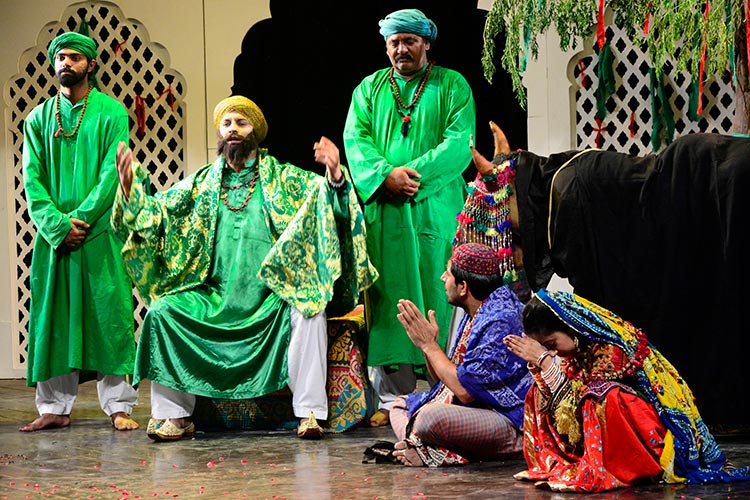Written by: Mahnaz Shujrah
Posted on: October 30, 2018 |  | 中文
| 中文
Allah Wassaya (Usman Raj) and Sohni (Hina Tariq)
Last Thursday, 25th October 2018, Government College University (GCU), Lahore hosted a Remembrance for Madeeha Gauhar, an outstanding alumnus of the institution. The evening started off with a session to honour the late founder of Ajoka Theatre, followed by a performance of one of her favourite plays, “Kala Meda Bhes,” in Bukhari Auditorium. The chief guests, including some friends and family of Madeeha, were Justice Nasira Iqbal, Naeem Tahir, Shahid Nadeem, Shaista Siraj ud Din, and Vice Chancellor of GCU, Dr. Hasan Amir Shah.
"Kala Meda Bhes" (Black are my robes) is one of Ajoka's most acclaimed plays, and has been staged many times in Pakistan, as well as across the border in different cities of India, including Calcutta, Chandigarh, and New Delhi. The play revives a traditional form of theatre, known as "swaang," native to the region of Punjab. The play is written by Shahid Nadeem and was originally directed by Madeeha Gauhar.
Although based on a real incident that took place in Sindh years ago, the play is set in a village of Cholistan desert in South Punjab. The water resources of this small village run dry, except for a well at the Darbar of the local Pir, who overlooks the distribution of his "blessed" water.
Following the traditional rules of “swaang,” the story was narrated in a rhyming, musical way by Gaaman (Qaiser Khan) and Rukka (Zeeshan Haider). The plot revolves around the character of Allah Wassaya (Usman Raj), who has recently gotten married for a second time, and received an ox along with his wife, Sohni (Hina Tariq). He visits Pir Khooi Shah (Sibte Hasan) for his blessings in order to have a child, since his first wife, Sundri (Nayab Faiza), was childless. He also prays especially for the health of his ox, which he hopes to use in a new business of bringing water from the neighbouring village.

Through their visits to the Pir, different characters and their backgrounds were introduced to the audience. Peeran Ditta (Sohail Tariq) is a hardworking villager with young children, who comes to pray for his ill wife. He also asks for the Pir's blessings, since he is on a quest to discover a new well for the village. The Pir advises both Allah Wassaya and Peeran Ditta to abandon their hopes for these material benefits and focus on the ways of "wada sarkar," i.e. the creator. He goes on to give different forms of taveez (amulets) to the villagers.
As both Peeran Ditta’s wife and Allah Wassaya’s ox die, the audience sees how strangely similar the pain of both characters is. The background music and song emphasized this aspect beautifully. Maasi (Razia Malik), an elder of the community, suggests an exchange: a woman in exchange for an ox. As the plot takes a turn towards the climax, Sundri becomes the leading figure of the play, and through her dialogues many of the play’s themes are realized.
Central to the plot is the character of Opra (Naseem Abbas), a strange man from a distant land, recognizable through his black robes, and itinerant Sufi persona. Initially the villagers are confused by him, but he soon creates a place for himself in the community. His conversations with Sundri reveal a painful and endless search, but despite his own sorrows, he gives her and the villagers hope, in contrast to the manipulative Pir.
The most fascinating/interesting aspect of the play was how successfully it transported the audience to a different time and ethos. The play was performed in Siraiki, and all the actors did a spectacular job in their dialogue delivery. The traditional costumes, dance and music not only provided entertainment, but also added a tinge of nostalgia. The live flute and dhol, played by Akmmal and Thomas, added life to the performance, along with the on-stage singing by Naseem Abbas. The dialogues were especially witty at times, keeping the audience fully engaged. The arguments between Allah Wassaya, Sohni and Sundri, made the performance a highly relatable one. Each and every actor was memorable in his or her own way, but Sundri (Nayab Faiza) did a phenomenal job at conveying emotions with her expressions.
Ajoka Theatre highlights the different dimensions of a culture through this production, especially those aspects which are often swept under the rug. The idea of exchanging an ox for a woman seems absurd, but given the extreme social and economic circumstances of the two families, it is a viable option according to the traditional norms. Often, we are led to believe certain things due to our difficult circumstances, but we must remain vigilant and aware, not only of our surroundings, but of ourselves.
Kala Meda Bhes highlights another issue which remains relevant throughout history: a select few controlling the means of production and power in a society. By associating religious significance to the well, the Pir was able to control the only source of water in the village. Often those in power will go to extremes to maintain their control, but as the play points out, by standing united in opposition, we can resist oppression.
You may also like: